Submitted:
18 March 2024
Posted:
22 March 2024
You are already at the latest version
Abstract
Keywords:
1. Introduction
2. Fault Characteristics Analysis
3. Simulation Result and Analysis
4. Lab Experiment Result and Analysis
5. Discussion
Author Contributions
Funding
Acknowledgments
Conflicts of Interest
References
- Cheng, L.; Chen, Q. A survey on faulty line selection technology for single-phase grounded transmission line in small current neutral grounded system. Power System Technology, 2009, 33, 219–224. [Google Scholar]
- Wang, J.; Zhu, Y.; Qin, S. Fault line selection method for small current grounding system based on directional traveling wave energy. Transactions of China Electrotechnical Society, 2021, 36, 4085–4096. [Google Scholar]
- Wang, X.; Du, H.; Liang, Z.; Guo, L.; Gao, J.; Mostafa, K.; Liu, W. Single phase to ground fault location method of overhead line based on magnetic field detection and multi-criteria fusion. Int J Electr Power Energy Syst, 2023, 145, 108699. [Google Scholar] [CrossRef]
- Li, H.; Chen, J.; Liang, Y. , Liao, F.; Wang, G. Effects of imbalance on single-phase to ground fault characteristics in low-resistance grounded systems. Int J Electr Power Energy Syst, 2020, 115, 105504. [Google Scholar] [CrossRef]
- Yao, H.; Cao, M. Resonant grounding of power system; China Electric Power Press: Beijing, 2000. [Google Scholar]
- Ren, W.; Xue, Y.; Yang, F.; Xu, B. Modeling and analysis of arc grounding faults in isolated neutral distribution network. Power System Technology, 2021, 45, 705–712. [Google Scholar]
- Liang, D.; Xu, B.; Tang, Y.; Wang, P.; Wang, W. Model and detection method for tree-contract single-phase-to-ground faults on 10kV overhead lines. Proceeding of the CSEE, 2021, 41, 5221–5232. [Google Scholar]
- Zhang, Z.; Liu, J.; Shao, W.; Wang, Y. Fault line selection using multiple disturbance characteristics of fault phase active grounding in resonant grounded distribution networks. Int J Electr Power Energy Syst 2022, 138, 107931. [Google Scholar] [CrossRef]
- Li, L.; Gao, H.; Cong, W.; Yuan, T. Location method of single line-to-ground faults in low-resistance grounded distribution networks based on ratio of zero-sequence admittance. Int J Electr Power Energy Syst 2023, 146, 108777. [Google Scholar] [CrossRef]
- Luan, X.; Wu, S.; Jia, C.; Yang, Y.; Zhang, Z.; Luo, X. Fault line selection principle of single-phase-to-ground fault based on improved zero-sequence admittance. Power System Technology, 2022, 46, 353–360. [Google Scholar]
- Wang, Y.; Liu, J.; Zhang, Z.; Zheng, T.; Ren, S.; Chen, J. A faulty line detection method for single phase-to-ground fault in resonant grounding system with CTs reversely connected. Int J Electr Power Energy Syst, 2023, 147, 108873. [Google Scholar] [CrossRef]
- Xu, B.; Xue, Y.; Feng, G.; Wang, C. Discussion on several problems of earthing fault protection in distribution. Automation of Electric Power System, 2019, 43, 1–7. [Google Scholar]
- Liu, J.; Zhang, X.; Shen, W.; Quan, L.; Zhang, Z. Performance testing of single phase to earth fault location for distribution network with neutral point non-effectively grounded systems. Automation of Electric Power System, 2018, 42, 138–143. [Google Scholar]
- Luo, J.; He, J.; Zhao, H.; Yang, H.; Zhang, J.; Liu, L.; Wang, R. Fault line selection based on zero sequence power direction of transient fundamental frequency in MV network grounded with ARC extinguishing coil. 2006 International Conference on Power System Technology. Chongqing, China, 2006, 1-4.
- Yanru N, Xiangjun Z, Zhanlei L, Kun Y, Pengbo X, Zhan W, Chao Z, Yue H. Faulty feeder detection of single phase-to-ground fault for distribution networks based on improved K-means power angle clustering analysis. Int J Electr Power Energy Syst 2022, 142, 108252. [CrossRef]
- Zeng, X.; Yin, X.; Zhang, Z.; Chen, D. Study for negative sequence current distributing and ground fault protection in middle voltage power systems. Proceedings of the CSEE, 2001, 21, 84–89. [Google Scholar]
- Griffel D, Leitloff V, Harmand Y. A new deal for safety and quality on MV networks. IEEE Trans on Power Delivery, 1997, 12, 1428–1433. [Google Scholar] [CrossRef]
- Lin, X; Ke, S.; Gao, Y.; Wang, B.; Liu, P. A selective single-phase-to-ground fault protection for neutral un-effectively grounded systems. Int J Electr Power Energy Syst, 2011, 33, 1012–1017. [CrossRef]
- Abdul, G.; Ramana, R. A new wavelet based fault detection, classification and location in transmission lines. Int J Electr Power Energy Syst, 2015, 64, 35–40. [Google Scholar]
- Yuan, J.; Jiao, Z. Faulty feeder detection for single phase-to-ground faults in distribution networks based on patch-to-patch CNN and feeder-to-feeder LSTM. Int J Electr Power Energy Syst, 2023, 147, 108909. [Google Scholar] [CrossRef]
- Vladimir, K.; Andrey, L.; Evgenia, K. Monitoring in 6–35 kV power networks, location of single-phase ground fault and detection of fault feeder. Int J Electr Power Energy Syst 2023, 152, 109271. [Google Scholar]
- Ferreira, K.; Emanuel, A. A noninvasive technique for fault detection and location. IEEE transactions on power delivery, 2010, 25, 3024–3034. [Google Scholar] [CrossRef]
- Jiang, B.; Dong, X.; Shi, S. A method of single phase to ground fault feeder selection based on single phase current traveling wave for distribution lines. Proceeding of the CSEE, 2014, 34, 6216–6227. [Google Scholar]
- Li, G.; Xue, Y.; Xu, B.; Yang, F. Analysis on arc re-ignition transient characteristics for grounding fault in non-solidly grounding system. Automation of Electric Power System, 2020, 44, 189–196. [Google Scholar]
- Li, T.; Wang, F.; Zhu, L.; Li, J. A new method of distribution network single-phase ground fault line selection based on the intrinsic mode energy entropy. Power System Technology 2008, 32, 128–132. [Google Scholar]
- Yang, F.; Ren, W.; Shen, Y.; Lei, Y.; Xue, Y.; Xu, B. Transient analysis method and identification of arc grounding faults in petersen coil grounded distribution network. Proceedings of the CSU-EPSA, 2021, 33, 23–31. [Google Scholar]
- Fang, Y.; Xue, Y.; Song, H. , Guan, T.; Yang, F.; Xu, B. Transient energy analysis and faulty feeder identification method of high impedance fault in the resonant grounding system. Proceeding of the CSEE, 2018, 38, 5636–5645. [Google Scholar]
- Xue, Y.; Xu, B.; Feng, Z.; Li, T. Study on transient directional protection principle for small current grounding fault. Proceeding of the CSEE, 2003, 23, 51–56. [Google Scholar]
- Xue, Y.; Feng, Z.; Xu, B.; Chen, Y.; Li, J. Research on fault line selection for small current grounding based on transient zero sequence current comparison. Automation of Electric Power System, 2003, 27, 48–53. [Google Scholar]
- Li, Z.; Ye, Y.; Xiao Ma, X.; Lin, X.; Xu, F.; Wang, C.; Ni, X.; Ding, C. Single-phase-to-ground fault section location in flexible resonant grounding distribution networks using soft open points. Int J Electr Power Energy Syst 2020, 122, 106198. [Google Scholar] [CrossRef]
- Sang, Z.; Zhang, H.; Pan, Z. Signal phase grounding fault protection fault protection by injecting currents in ineffective grounding system. Automation of Electric Power System, 1996, 20, 11–12. [Google Scholar]
- Zeng, X.; Yin, X.; Yu, Y. New method for control and protection relay in a compensated medium voltage distribution net-work based on injecting various frequency current. Proceeding of the CSEE, 2000, 20, 29–33. [Google Scholar]
- Xu, B. Distribution network relay protection and automation. China Electric Power Press, Beijing, 2017.
- Ojanguren, I.; Ruiz, N.; Garcia, J. MV high impedance faults detection based on LV measurements. International Conference on Electricity Distribution, 2017. [Google Scholar]
- Francinei, L.; Pedro, H.; Jose, M.; Roberto, C.; Marino, P. A voltage-based approach for series high impedance fault detection and location in distribution systems using smart meters. Energies, 2019, 12, 3022. [Google Scholar]
- Zhang, Y.; Zhang, S.; Zhang, W.; Xiao, X. Fault section location of a distribution network based on voltage variation of the secondary side of a transformer in the station area. Power System Protection and Control, 2022, 50, 23–32. [Google Scholar]
- Jia, K.; Ren, Z.; Bi, T.; Yang, Q. Ground fault location using the low-voltage-side recorded data in distribution systems. IEEE Transactions on Industry Applications, 2015, 51, 4994–5001. [Google Scholar] [CrossRef]
- Sture, L. Sensitive earth fault protection for MV distribution system. CIRED.
- Jie, L.; Tang, K.; Zhang, T.; Zhou, X. Research on ground fault line detection based on phase-frequency characteristics of transient signals. Power System Protection and Control, 2009, 37, 50–54. [Google Scholar]
- Xue, Y. Earth fault detection based on characteristic transient information in non-solidly earthed network. Xi'an Jiaotong University, 2003. ph.D. thesis.
- Xu, B.; Xue, Y.; Li, J.; Cheng, Y. Single phase fault detection technique based on transient current and its application in non-solid grounded network. 2001 Seventh International Conference on Developments in Power System Protection, Amsterdam, Netherlands, 2001.141-144.
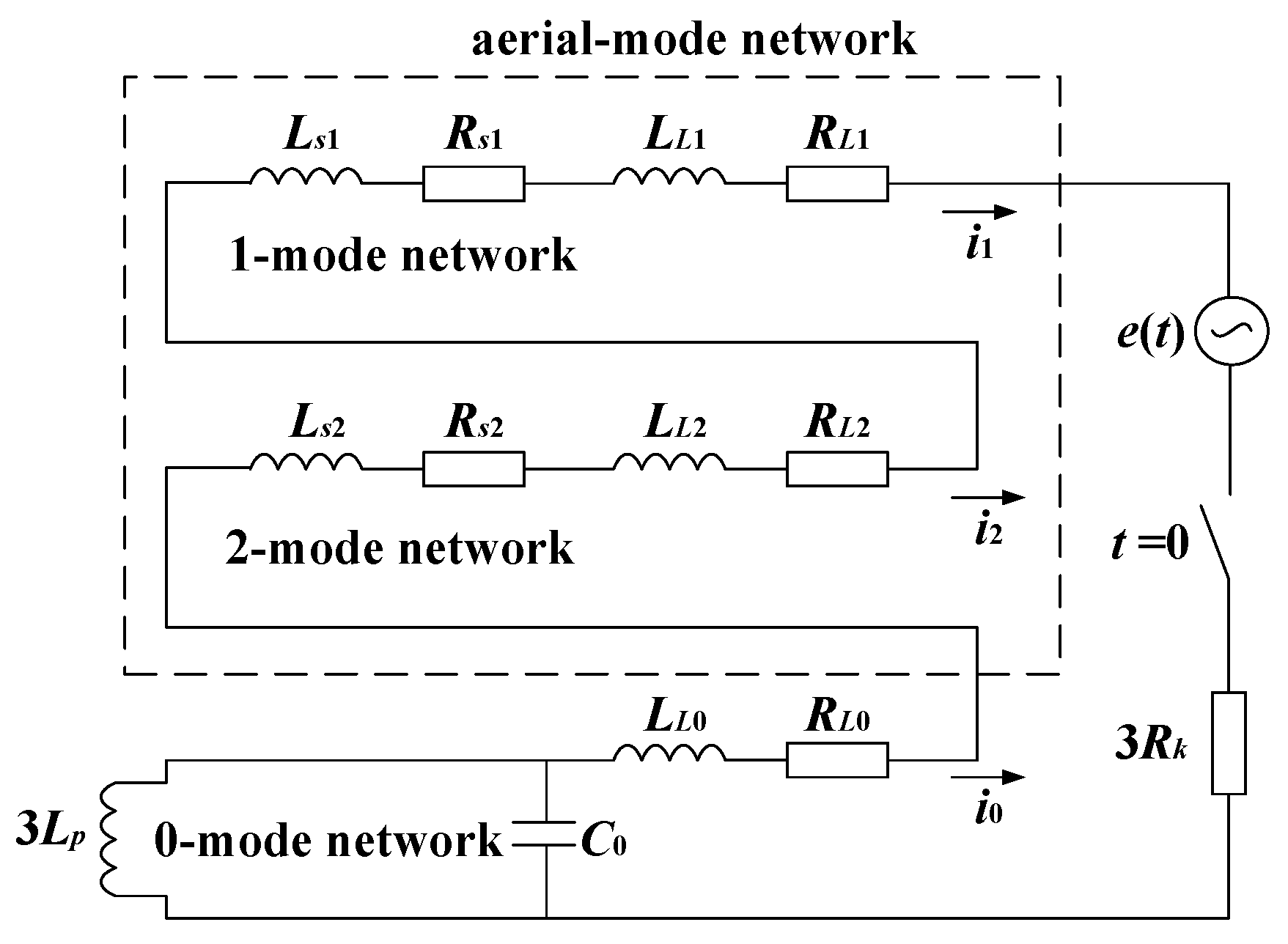
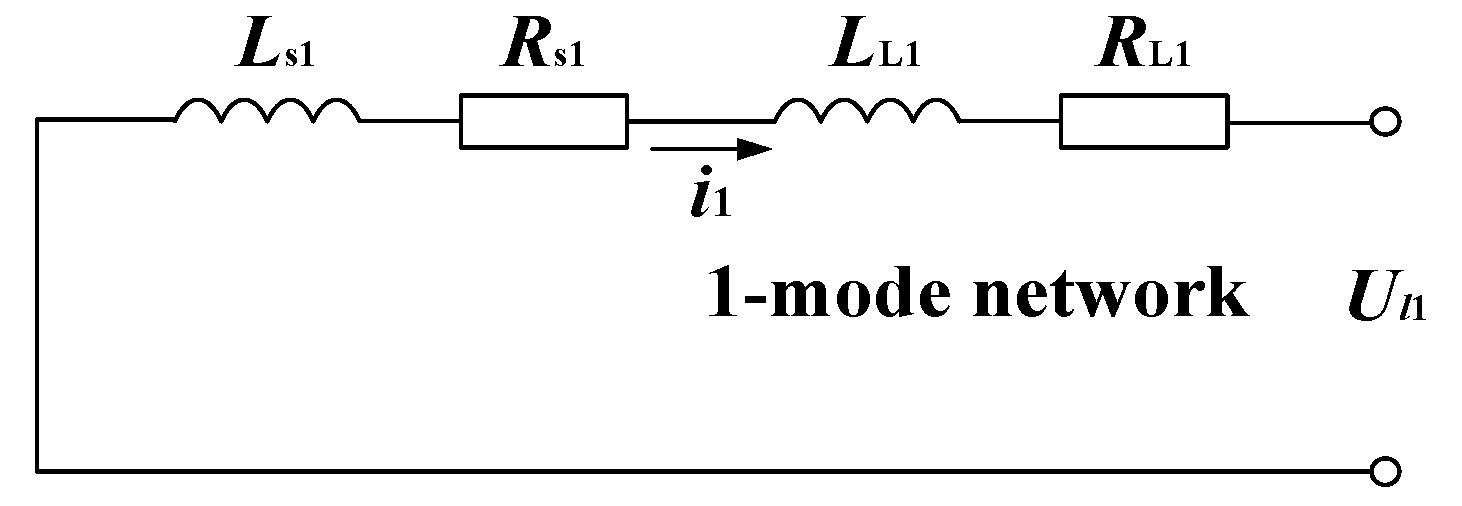
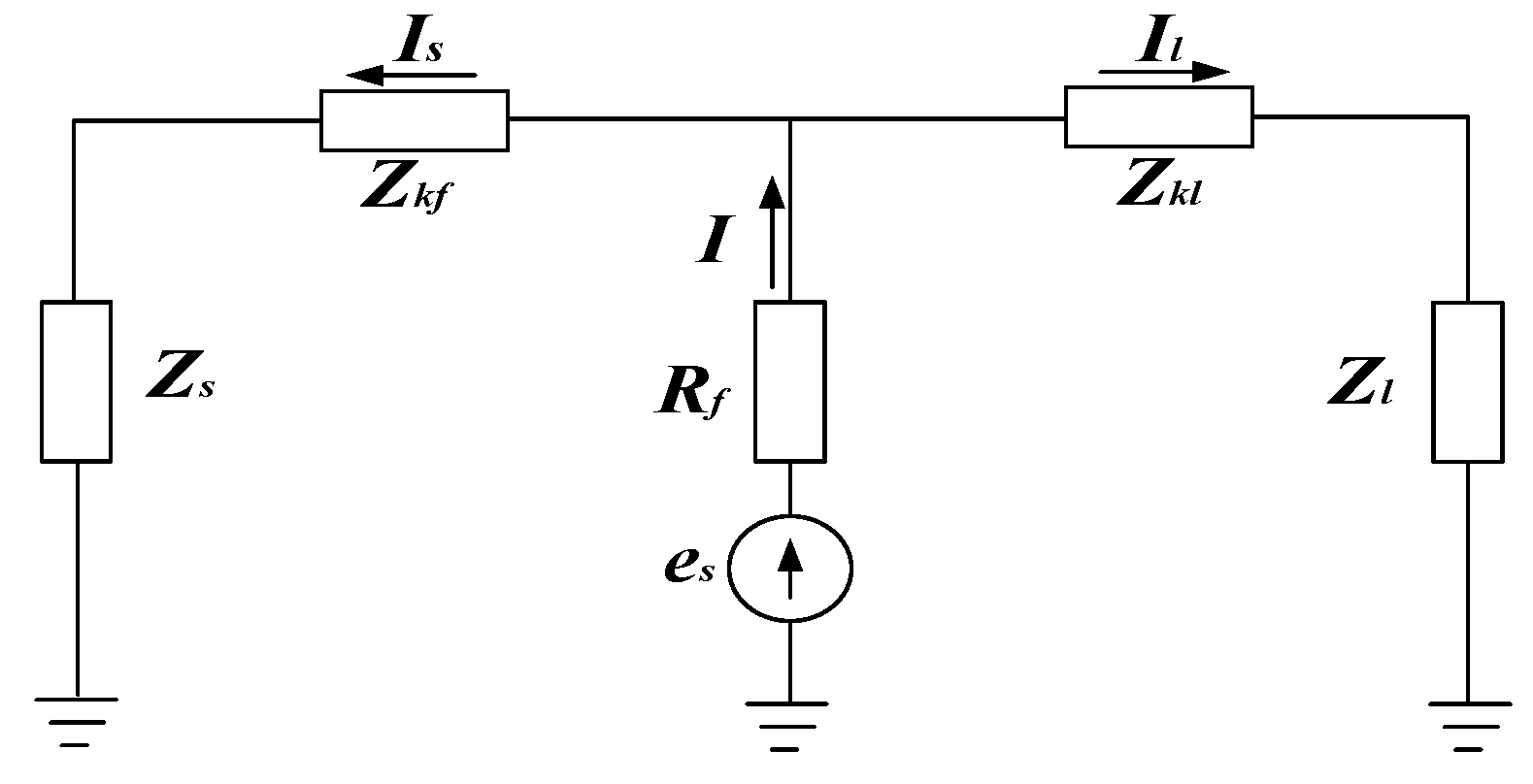
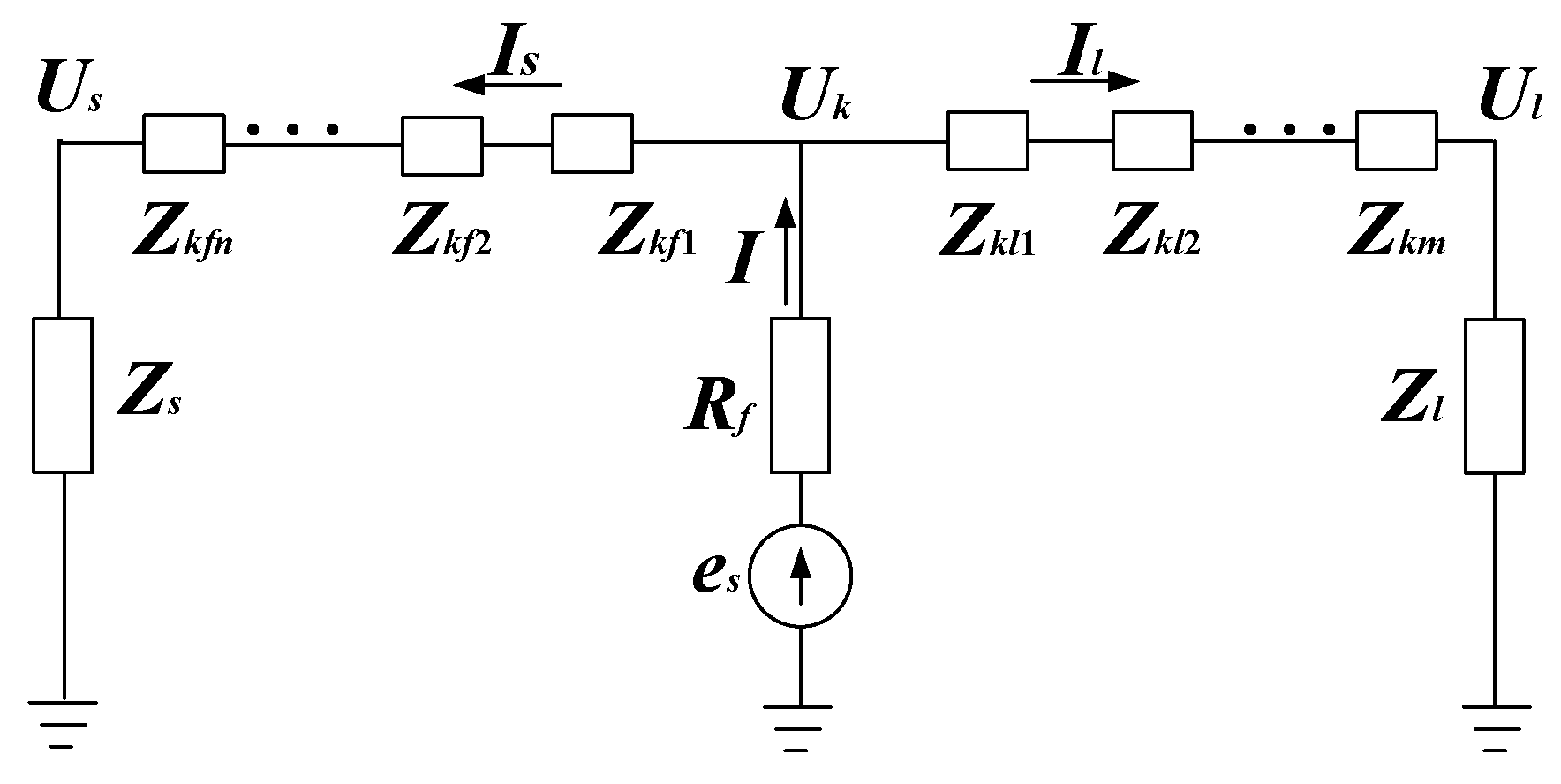

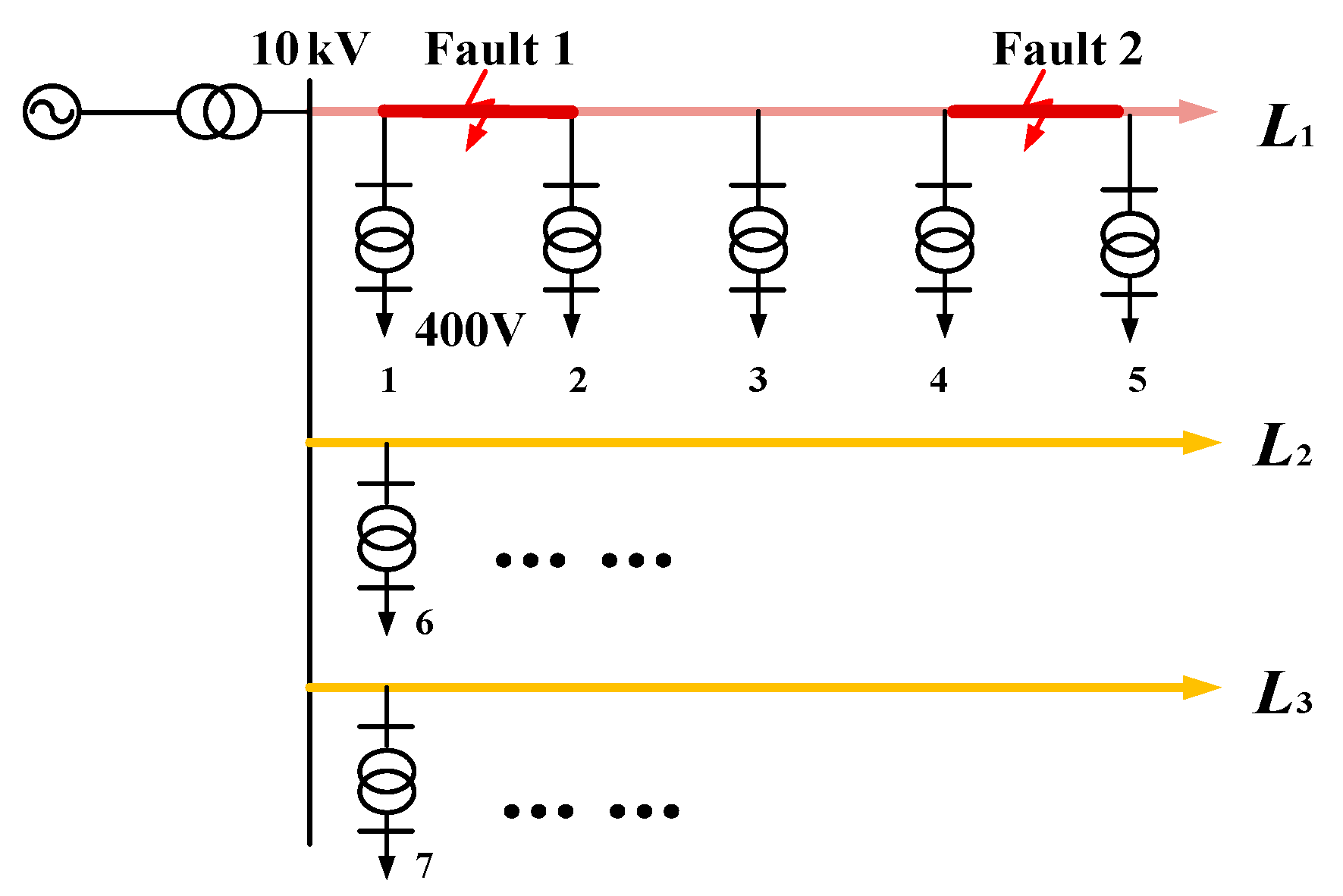
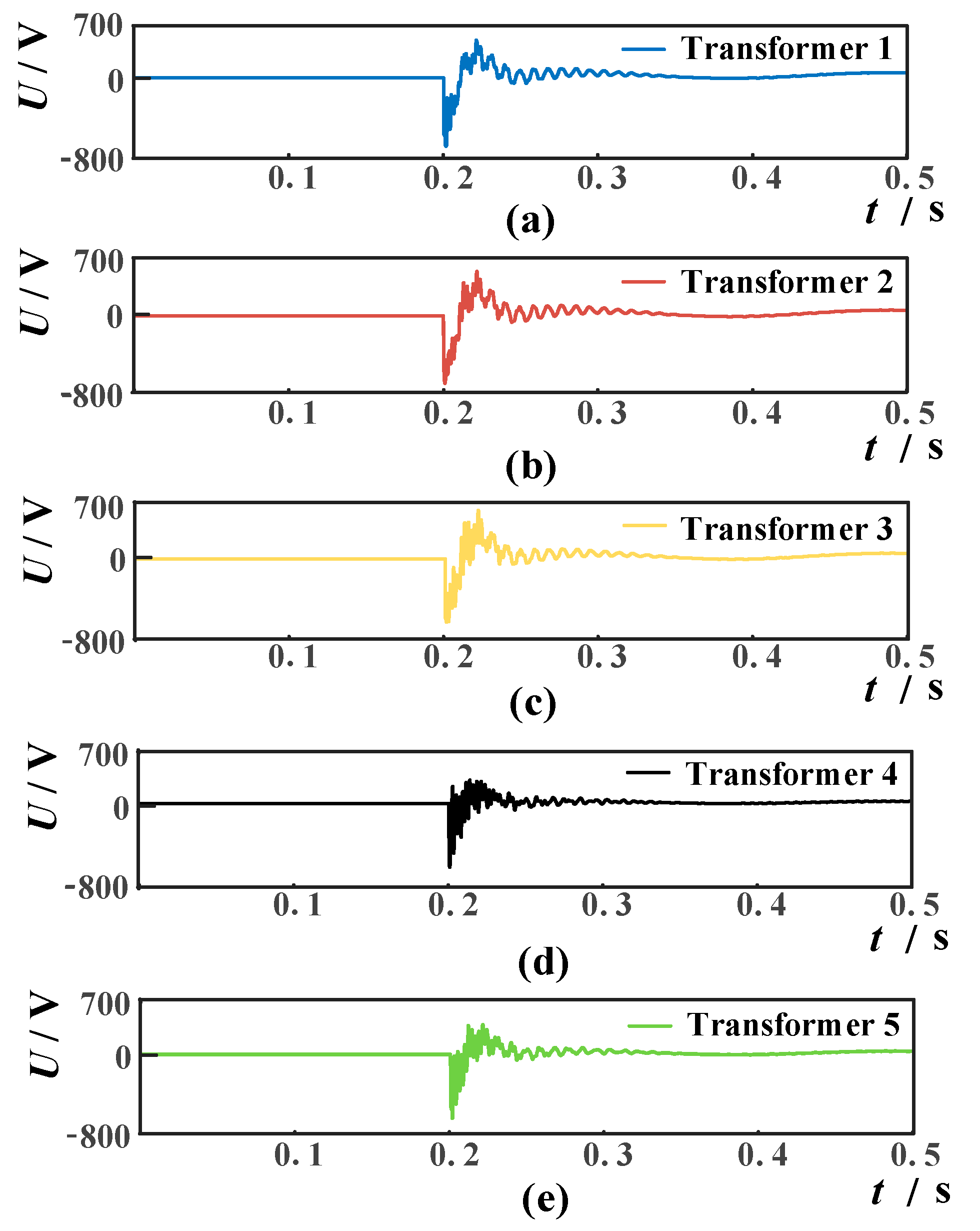
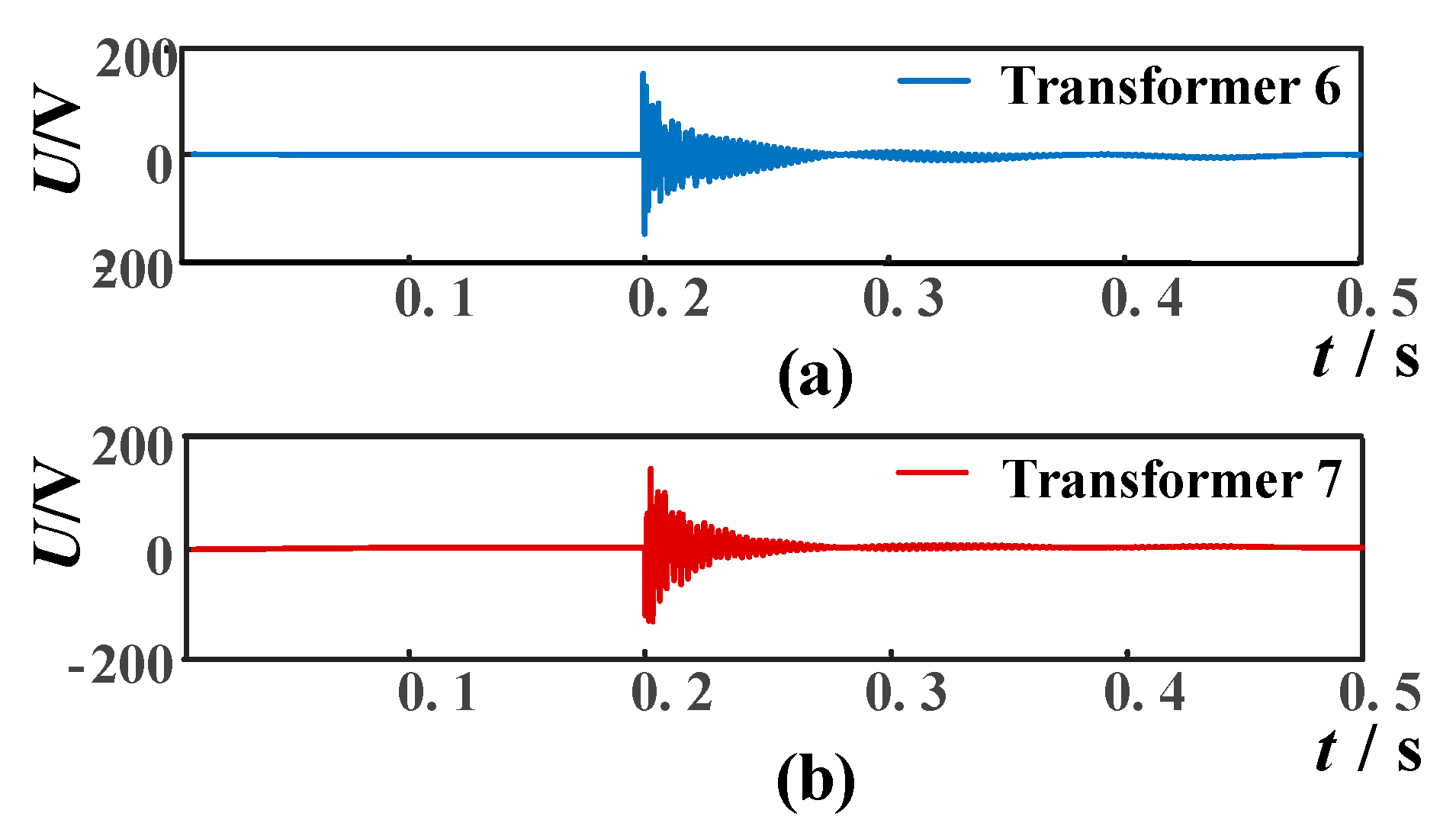
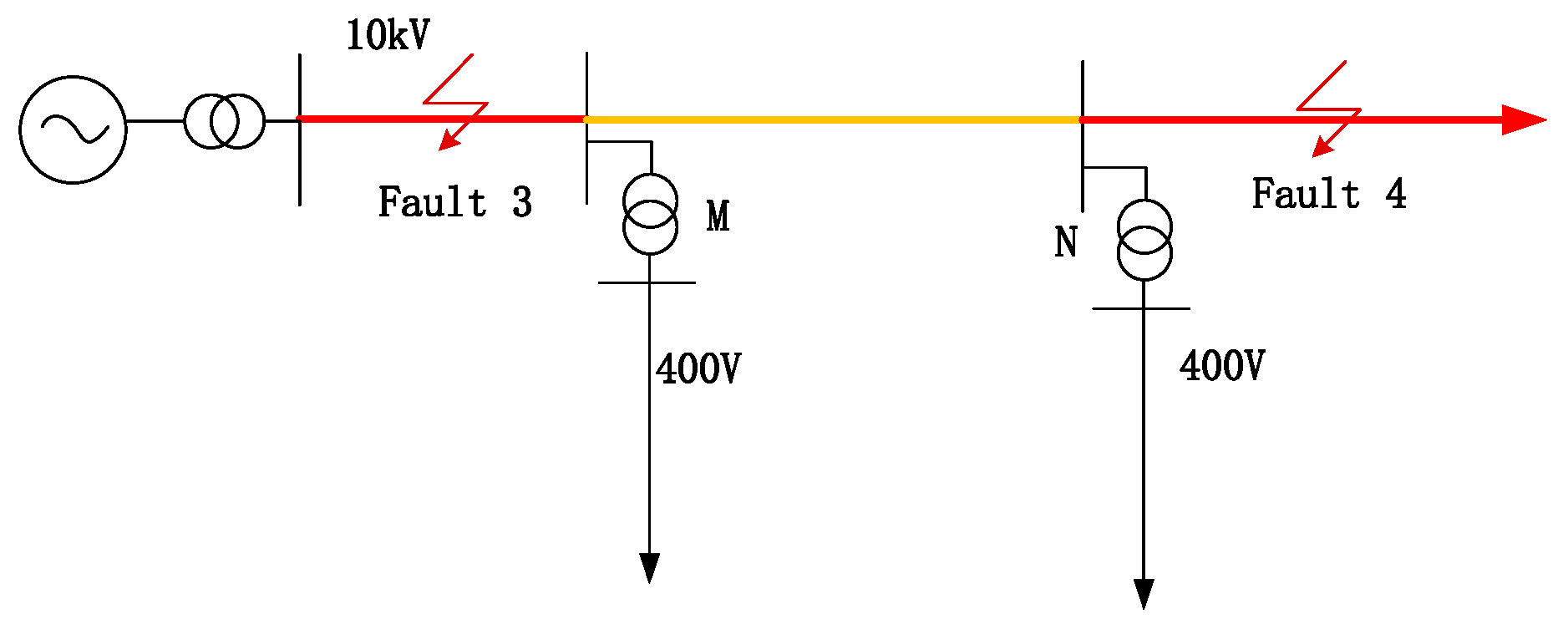
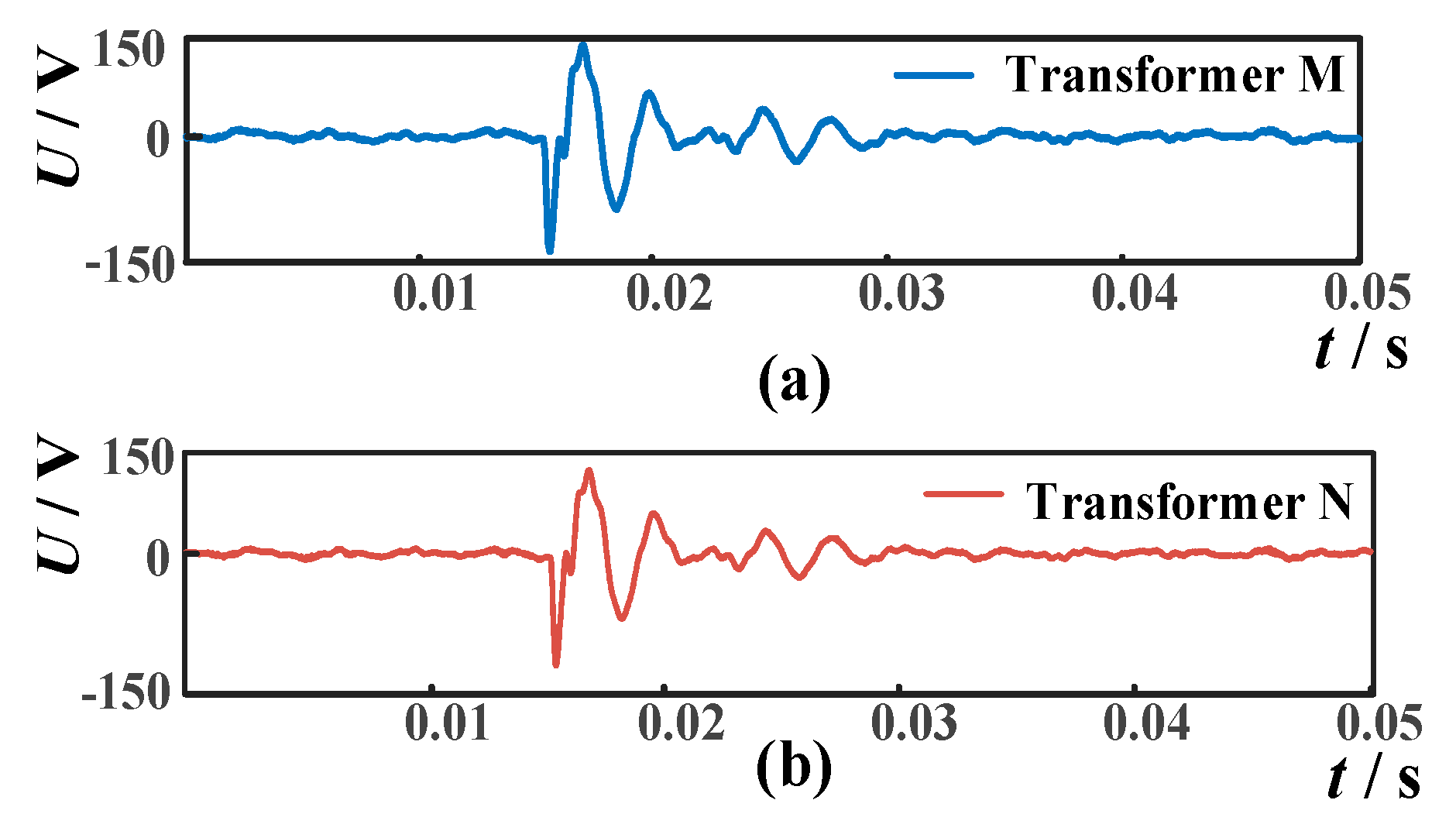
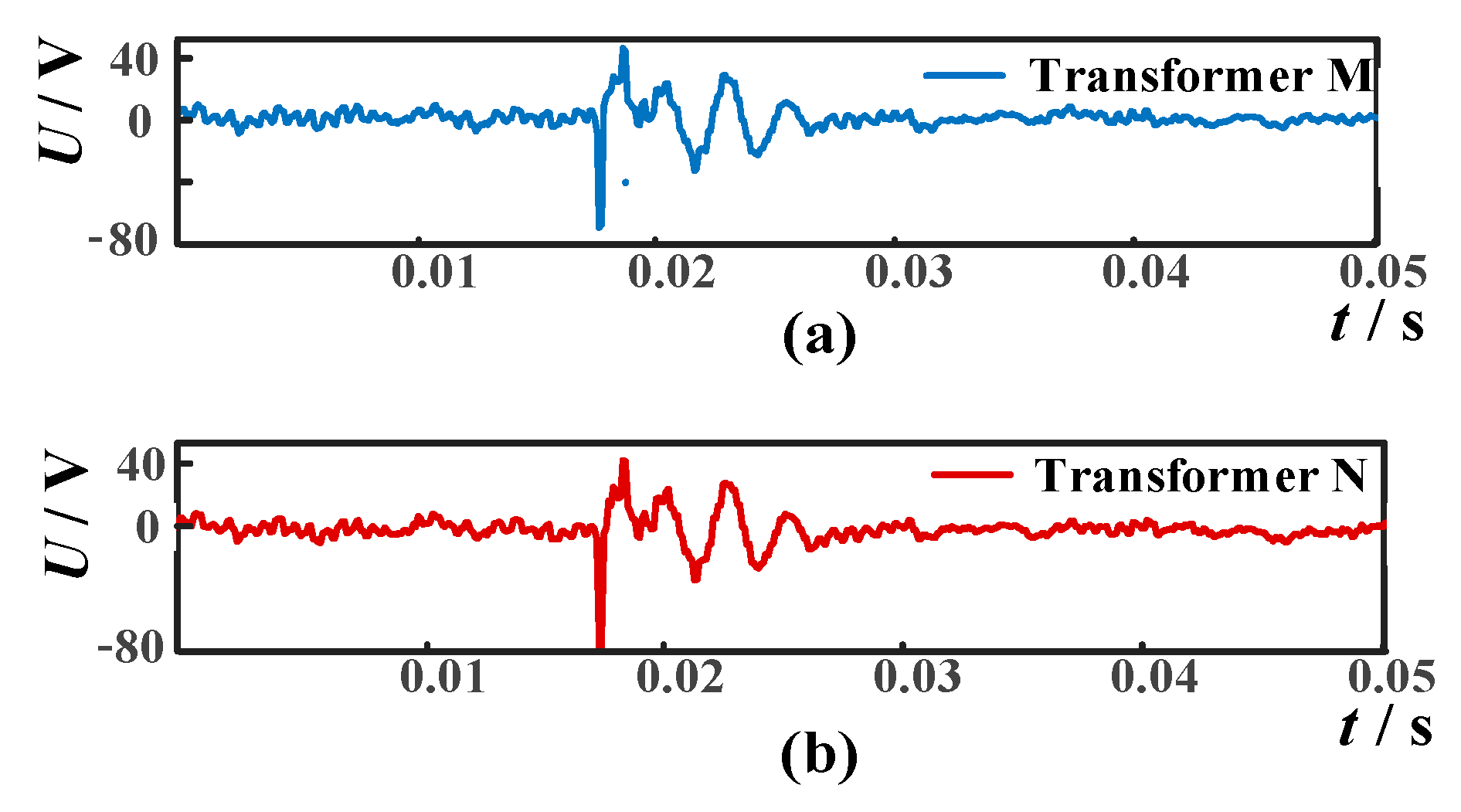
| Neutral grounding mode | Fault resistance/Ω | AMV amplitude /V | ||||||
|---|---|---|---|---|---|---|---|---|
| 1 | 2 | 3 | 4 | 5 | 6 | 7 | ||
| Arc suppression coil | 0 | 694.9 | 699.7 | 686.0 | 682.3 | 679.1 | 126.6 | 124.2 |
| 10 | 575.4 | 577.7 | 573.7 | 570.2 | 568.0 | 109.8 | 108.0 | |
| 100 | 219.7 | 221.4 | 217.3 | 214.8 | 211.7 | 36.9 | 36.1 | |
| Ungrounded | 0 | 913.1 | 920.0 | 902.4 | 889.5 | 877.5 | 159.6 | 161.4 |
| 10 | 749.7 | 754.6 | 745.5 | 738.2 | 730.1 | 138.7 | 137.6 | |
| 100 | 274.9 | 276.7 | 271.7 | 267.6 | 263.8 | 66.1 | 65.7 | |
| Resistance 6Ω | 0 | 759.3 | 765.1 | 755.8 | 746.9 | 738.6 | 142.3 | 141.3 |
| 10 | 628.8 | 631.3 | 623.3 | 615.1 | 609.5 | 126.8 | 125.8 | |
| 100 | 252.0 | 253.8 | 249.7 | 247.1 | 243.2 | 56.5 | 56.1 | |
| Neutral grounding mode | Fault resistance/Ω | AMV amplitude /V | ||||||
|---|---|---|---|---|---|---|---|---|
| 1 | 2 | 3 | 4 | 5 | 6 | 7 | ||
| Arc suppression coil | 0 | 662.2 | 667.1 | 671.7 | 680.6 | 677.2 | 122.2 | 124.0 |
| 10 | 561.9 | 567.3 | 563.7 | 569.6 | 567.3 | 107.6 | 106.9 | |
| 100 | 204.6 | 207.7 | 211.8 | 215.1 | 213.4 | 35.7 | 34.4 | |
| Ungrounded | 0 | 871.4 | 883.5 | 898.6 | 912.8 | 907.9 | 153.4 | 161.3 |
| 10 | 722.3 | 728.1 | 733.8 | 742.7 | 737.3 | 126.6 | 129.1 | |
| 100 | 253.8 | 258.4 | 262.6 | 267.3 | 266.4 | 64.7 | 62.3 | |
| Resistance 6Ω | 0 | 729.2 | 736.9 | 743.6 | 751.9 | 748.3 | 136.7 | 135.8 |
| 10 | 607.3 | 612.2 | 619.3 | 625.3 | 623.5 | 114.4 | 112.4 | |
| 100 | 231.7 | 234.8 | 238.0 | 241.5 | 240.8 | 54.3 | 53.1 | |
| Transformer | Amplitude /V | |
|---|---|---|
| Fault 3 | M | 133.31 |
| N | 123.78 | |
| Fault 4 | M | 75.50 |
| N | 78.53 |
| Fault 3 | |||
| Neutral grounding mode | Fault resistance /Ω | Amplitude /V | |
| Transformer M | Arc suppression coil | 0 | 133.31 |
| 500 | 2.82 | ||
| Ungrounded | 0 | 398.14 | |
| 500 | 3.66 | ||
| Resistance 6Ω | 0 | 201.2869 | |
| 500 | 3.32 | ||
| Transformer N | Arc suppression coil | 0 | 123.78 |
| 500 | 2.65 | ||
| Ungrounded | 0 | 240.15 | |
| 500 | 3.39 | ||
| Resistance 6Ω | 0 | 184.57 | |
| 500 | 3.13 | ||
| Fault 4 | |||
| Neutral grounding mode | Fault resistance /Ω | Amplitude /V | |
| Transformer M | Arc suppression coil | 0 | 75.50 |
| 500 | 1.54 | ||
| Ungrounded | 0 | 129.81 | |
| 500 | 2.43 | ||
| Resistance 6Ω | 0 | 136.08 | |
| 500 | 2.97 | ||
| Transformer N | Arc suppression coil | 0 | 78.53 |
| 500 | 1.83 | ||
| Ungrounded | 0 | 187.91 | |
| 500 | 2.62 | ||
| Resistance 6Ω | 0 | 150.17 | |
| 500 | 3.09 | ||
Disclaimer/Publisher’s Note: The statements, opinions and data contained in all publications are solely those of the individual author(s) and contributor(s) and not of MDPI and/or the editor(s). MDPI and/or the editor(s) disclaim responsibility for any injury to people or property resulting from any ideas, methods, instructions or products referred to in the content. |
© 2024 by the authors. Licensee MDPI, Basel, Switzerland. This article is an open access article distributed under the terms and conditions of the Creative Commons Attribution (CC BY) license (http://creativecommons.org/licenses/by/4.0/).





